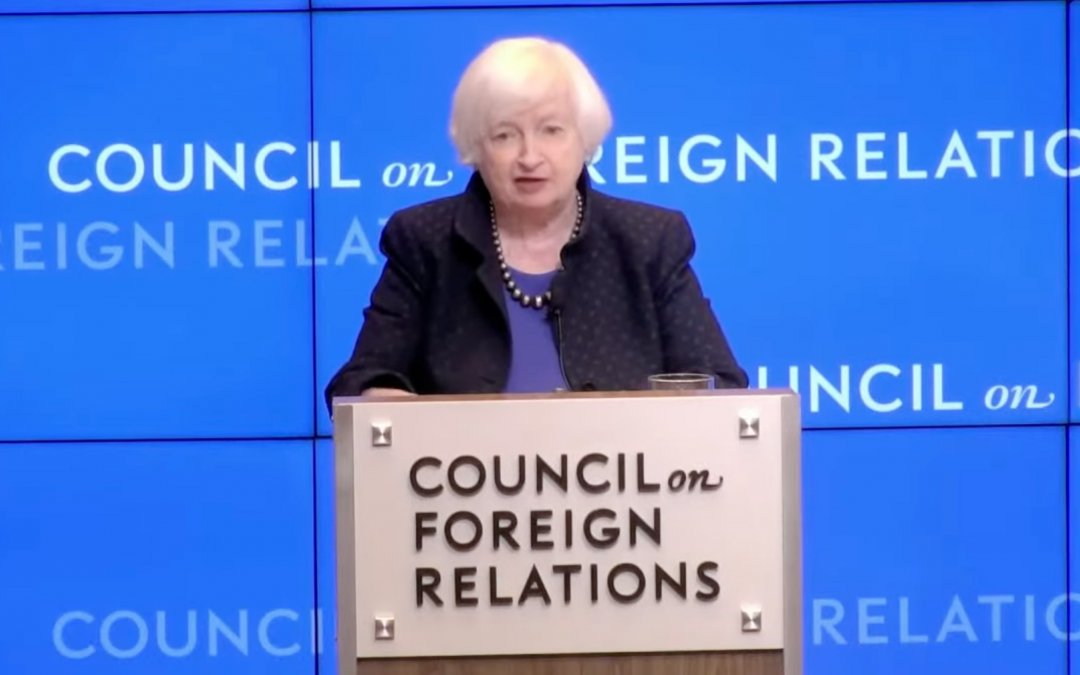WASHINGTON — Treasury Secretary Janet Yellen emphasized the need for the U.S. to maintain healthy economic global relations and warned against former President Trump’s proposed tariffs on Thursday at the Council on Foreign Relations in New York.
“Calls for walling America off with high tariffs on friends and competitors alike or by treating even our closest allies as transactional partners are deeply misguided,” she said.
Yellen, a longtime skeptic of tariffs, refrained from naming Trump but addressed the overuse of tariffs and its threats to national security. She warned that today’s issues — such as Russia’s invasion of Ukraine — meant that the U.S. cannot “go it alone.”
“We cannot simply draw from an old playbook,” she said.
Yellen called attention to key sectors like semiconductors, clean energy, and electric vehicles, where maintaining U.S. production capacity is vital for supply chain resilience and technological advancements reducing dependency on China.
She added that “sweeping, untargeted tariffs” would fuel inflation, harm domestic production, and raise the cost of living in the U.S., particularly for low-income households.
The critique comes just two days after Trump’s interview with Bloomberg Editor-in-Chief John Micklethwait, where he told the journalist that “tariff” was his “favorite word.”
Previously, Trump has threatened to impose across-the-board tariffs by as much as 60% on goods from China.
Though the Biden administration has kept most of the Trump administration’s tariffs on China in place due to fair trade violations, Yellen made it clear that broad-based tariffs “is not something that the Biden-Harris administration is supportive of at all.”
Vice President Kamala Harris has offered little insight into her trade policies, but she previously called Trump’s proposals a “sales tax” on the American people.”
In an interview with the Medill News Service, Matthew Goodman, director of REAL Econ at the Council on Foreign Relations, said that he anticipated “more trade on Harris’ side,” but she may choose to target technology instead.
“The Biden administration has been particularly focused on building this small yard-high fence on some critical technologies, like semiconductors, quantum computing, biotechnology,” Goodman said. “I would expect that work to be continued and strengthened.”
He added that Trump will likely lead with “anti-China rhetoric,” while Harris will take a more diplomatic approach.
Goodman referred to Yellen’s remarks as a “legacy speech,” just in time to direct attention to the Annual Meetings of the World Bank and International Monetary Fund, taking place next week.
Yellen emphasized that multilateral development banks have been “very high” on her agenda and that she expects the World Bank and other MDBs to prioritize global public goods.
While bolstering U.S. competitiveness and supply chains is essential, Yellen said that the nation will be forced to tackle global challenges like pandemics, climate change, and financial instability to mitigate risks of negative spillover to its economy and security. These will likely be the focus of conversation for the U.S. at next week’s meetings.
Last week, undersecretary for international affairs Jay Shambaugh alluded to a Project 2025 proposal for the U.S. to pull out of the IMF and World Bank if Donald Trump wins.
Despite concerns over the looming U.S. election outcome, World Bank President Ajay Banga said this has not been a topic of conversation.
“There’s no point in speculating on something when you don’t even know what the outcome will be,” he said at a press briefing that unveiled the Bank’s new corporate scorecard this morning.
He noted that the World Bank saw a substantial capital increase during Trump’s last term.
For the Bank, global public debt seems to be at the top of the agenda, estimated to top $100 trillion — or roughly 93% of global GDP, according to new projections by the International Monetary Fund.
The bank is providing liquidity to support “some of the poorest countries impacted by debt,” according to Banga.
“My objective at the annual meetings is to focus on what the bank can do to be a good player,” he said, adding that the scorecard will promote transparency of the Bank’s results and progress.
IMF Managing Director Kristalina Georgieva also gave an outlook for the Global Economy and Policy Priorities this morning in a “curtain raiser” for next week’s meetings.
The Annual Meetings of the World Bank and International Monetary Fund will commence on Monday, Oct. 21.

